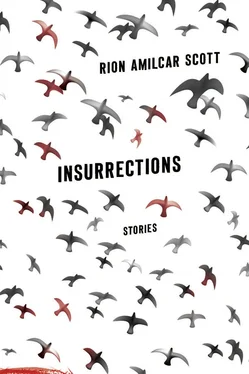Nicolette bounded up the embankment and walked swiftly along the track, listening to the music the rocks made beneath her feet. She shushed her son and bounced him, and finally he fell asleep peacefully against her chest. Every so often she’d stop to adjust the sling and to glance at the flickering fire at her back. Soon she could no longer see the injured men, and then even the flame was no longer visible.
What a long walk it would be that night, and an even longer journey across that twinkling river to wherever she’d eventually rest her head. She paused again to shift the sleeping baby. She looked down. At her foot lay a rock, big and smooth, heavy to the touch. Nicolette rested it in the sling, a good luck charm, sitting right where the tightness in her chest met the untroubled child.
In my eleventh year, my father taught me defeat.
I sat with my back pressed on that old, scratchy brown couch. Tom chased Jerry across the television screen and then the image dissolved into a white dot in the center. I turned to see my father holding the remote control in one hand and a crumpled cloth cradled in the crook of his other arm.
What are you doing with that rag, Daddy? I asked.
It’s not a rag, girl, he said. It’s a mat.
He unfurled the dirty checkered mat onto the coffee table and dropped a handful of chipped and faded black chess pieces in front of me. He started setting up the white ones without looking at me. I tilted my head, watching my father curiously.
I tentatively set up mine, following his lead. Each piece looked like a veteran of many battles, with nicks and gashes exposing the wood beneath the paint.
Your queen always starts off on her own color square, he said. She’s a woman like you and your mother. She likes to match. He reversed the positions of my king and queen.
When my father explained the rules, I thought I’d never be able to keep them straight, especially the rules about the horse, because he moved like a ballerina, jumping to far-off squares, or rather he galloped. I grabbed hold of a horse and moved him to a vacant square.
Now hold on, little girl, my father said. Chess is like real life. The white pieces go first so they got an advantage over the black pieces.
With that I removed my horse and he inched a pawn one square forward. I was on my way to being checkmated for the first time.
He was the god of chess each time he spread the crumpled mat and set up the pieces with his haggard, dark brown hands. I used to look at the grime beneath his fingernails and the scars on his knuckles, wondering why his hands looked older than him.
And my father’s voice crackled when we played chess. Daddy often sounded like a kung-fu master in one of those movies me and my brother watched on Saturday mornings. He didn’t speak like that all the time, but he always spoke like that when we played chess.
Once, I was so deep in concentration that I didn’t look up when my father broke our silence. Instead I chose to imagine one of my horses speaking.
I used to play this game with your grandfather when I was your age, he said sitting hunched over the board, moving around the pieces he had captured, waiting for me to make a move. Pop was good, he said. I never beat him.
How come?
’Cause he was good. Naw, really, I could have beat him had I had the chance. He got real sick. Couldn’t even finish the game we had going ’cause we took him to the hospital. He told me to bring the game with me when I went to see him. Your grandmother wouldn’t let me take it to the hospital, though. Don’t bother your father with that foolishness now . Daddy’s impression of my grandmother was a high-pitched shriek that sounded like her only in spirit, and even then it was Granny as a cartoon character. You know how your grandmother is, he continued. Every time we went, he used to ask me about the set and—
My father paused as I moved my queen to a middle square. He swooped in swiftly and tapped it from the board with the base of a knight. It bounced once it hit the carpet.
Thought you had something, huh? Let that be a lesson, little girl.
With my queen gone, I made my moves lazily, waiting for the twentieth checkmate, and then my father said this: You playing like the game’s done. The game ain’t over until that king is pinned down and can’t go nowhere.
If a pawn makes it to the other side, he told me, it becomes a queen. I imagined a little pawn magically blossoming into royalty on that last square.
It became something I longed to see. Sometimes when all was lost, I’d just inch a pawn forward, but the piece would never make it. The fifty-seventh checkmate was one of those games.
We woke early in the morning before I went off to school to continue a game carried over from the night before.
While we played, my father told me that when he was my age he imagined he’d be the first black grandmaster. He was the best chess player in school, winning casual games as easily as drinking a glass of water. He became king of the tournaments.
Yeah, figured one day everyone would call me Grandmaster Rob.
What happened?
Just didn’t work out that way, I guess. After a while, I wasn’t worrying about being no grandmaster or nothing like that. You stop thinking about these things at a certain age.
I’m going to be a grandmaster, I said.
My father stared hard at the board.
You know, Daddy, it’s never too late.
He chuckled, and in less than two minutes my king stood pinned by a bishop, a rook, and a pawn.
Checkmate!
He jumped and shuffled across the floor like the Holy Ghost had slithered up his pant leg.
Robert, she’s eleven years old, my mother said, passing by.
The girl ain’t too young to learn, he replied. Then he turned to me. Ain’t that right?
I nodded, thinking about my loss rather than whatever I was nodding about. My impotent pieces stood meekly, no longer any use.
He stuck his hand out for a victory shake.
You cheated me, I said, raising my voice a little, ignoring his hand and frowning, damning him for phantom moves I was sure he had made in my absence. Daddy, you cheated.
Don’t blame me because I’m better than you. You gotta start thinking two, three moves ahead. Then you can challenge me. Don’t worry about me. Worry about your game.
My mother called out from the next room. Said I was going to miss the bus. My little brother had walked off to wait without me. My mother stood before us talking fast and loud. She got this way sometimes. My father placed his hand softly on my head.
Come on, baby girl, stop pouting and get your stuff together. I’ll walk you to the bus stop.
My father never walked me to the bus stop in the mornings. Most days he’d leave for work early before I even got out of bed. He’d return late in the evening long after I had come home from school, his clothes and skin covered in black grease. After a half hour he’d walk out of his room looking immaculate, his face clean and smooth, each hair lined up waiting on my inspection. His hands, though, were always stained with traces of thick oil and dirt that rested beneath his fingernails. He’d sit on the couch with his scarred hands wrapped around a green beer bottle that rested on his thigh.
As I stood from the game, Daddy took my hand in his, and there sat the grease, nesting beneath his nails, as much a part of his hands as the creases and veins.
Even though in my little girl mind he had cheated me, the thought of walking with him filled me with pride, making me the happiest girl in all of Cross River.
Dammit, Robert! my mother said. You made her miss the bus.
I peered out the window to see its yellow tail pulling off.
Well, baby girl, we’re going to have to take the L9 downtown to Ol’ Cigar Station, my father said. But we got to leave right now, because I’m sure the buses are behind schedule.
Читать дальше












